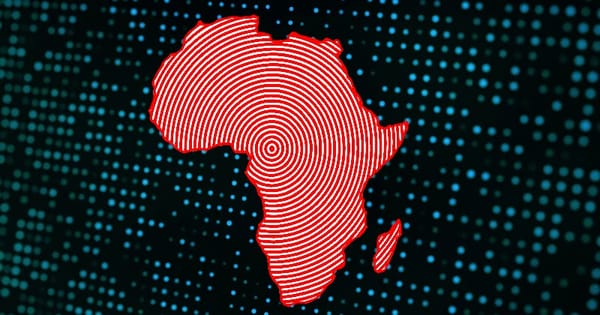Cybercrime is surging across Africa

A new INTERPOL report has sounded the alarm over a dramatic increase in cybercrime across Africa, with digital crime now accounting for a significant proportional of all criminal activity across the continent.
The report, published this week, paints a sobering picture with two-thirds of surveyed African countries reporting that cybercrime represents a medium-to-high proportion of their total reported crime.
In parts of Western and Eastern Africa, that proportion has skyrocketed, reaching or exceeding 30%.
The most reported cyber threats - according to the report - are online scams, ransomware, business email compromise, and digital sextortion, with suspected scam notifications rising an eye-opening 3000% in the last year in some African countries.
Ransomware, as with the rest of the world, is a significant problem in Africa - with South Africa and Egypt detecting the highest number of attacks at 17,849 and 12,281 respectively, followed by Nigeria (3,459) and Kenya (3,030).
Meanwhile, 60% of African countries report an increase in digital sextortion attacks, where criminals use either stolen or AI-generated sexual images to blackmail their targets.
Against this tidal wave of cybercrime, Africa appears to be a continent which is barely able to defend itself. The report notes that strong laws to fight cybercrime are only part of the solution - as many countries struggle to put enforce them. INTERPOL's study found 90% of respondents felt that their law enforcement or prosecution capacity needed "some or significant improvement" to counter the threat.
Despite the rising tide of cybercriminal activity, most African countries still lack essential infrastructure to combat it with just 30% of nations having incident-reporting platforms, and less than one in five (19%) having functioning cyberthreat intelligence databases.
Few national institutions, says INTERPOL, are staffed or equipped to respond to incidents in real time.
You get the impression that when it comes to the fight against cybercrime, Africa is outgunned and underfunded.
In addition, many countries lack cross-border co-ordination when it comes to countering cybercriminal activity - a necessity considering how cybercrime conceived in one territory can cause harm in another.
Over 86% of African law enforcement agencies reported insufficient international cooperation on cybercrime investigations, while nearly 90% cited a lack of strong public-private partnerships.
There is clearly bad news amongst these statistics, but there are also signs of progress. For instance, a number of African nations have taken steps to modernise their legislation, and set up international frameworks to combat cybercriminal activity. Furthermore, there are investments being made into equipping officers with training, forensic labs, and expertise to counter 21st century crime.
INTERPOL also highlights Operation Serengeti, a joint initiative which led to the over 1,000 arrests across 19 African nations of people suspected of involvement in ransomware, business email compromise, sextortion and online scams.
Similarly Operation Red Card was a multinational law enforcement operation conducted from November 2024 to February 2025 that resulted in over 300 arrests of suspected cybercriminals across seven African countries.
Clearly there has been some good work done by law enforcement agencies who are in need of great resources. Going forward much more investment will be required. Not only is the amount of cybercrime that is impacting the people of Africa on the rise, but emerging dangers such as AI-powered scams and deepfake manipulation mean that things are likely to get worse quicker than anyone can imagine.
tags
Author
Graham Cluley is an award-winning security blogger, researcher and public speaker. He has been working in the computer security industry since the early 1990s.
View all postsYou might also like
Bookmarks
